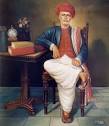
11th June in Dalit History – Mahatma Jyotiba Phule wrote letter to the conference of Marathi authors
11 June 1885: Dyanodaya newspaper published letter by Mahatma Jyotiba Phule to the conference of Marathi authors.
The second annual Marathi literary conference was held on 24 May 1885 in the Sarvajanik Hall in Pune (Maharasthra), under the president ship of Krishnashastri Rajwade, and attended by nearly 300 litterateurs. Justice M G Ranade, the organizer of the conference wrote to Mahatma Jyotiba Phule requesting him to participate in the plenary session. Mahatma did not. But he sent a reply to Ranade, Some 43 letters from those who could not attend were read out among which Mahatma Jyotiba Phule’s letter came first. Mahatma’s letter clearly expressed his ideology in short, succinct words. Hitherto a discussion on the problems of the poor had rarely been awarded an important place in Marathi literature.[1] The letter was subsequently published in Dyanodaya newspaper of 11 June 1885. The letter is as follows:
Dear Sir,
I acknowledge the receipt of your letter regarding the proposed conference of the (Marathi) authors and I was delighted to receive your request that I should participate in this conference. But then esteemed sir, the conferences and the books of those who refuse to think of human rights generally, who do not concede them to others and going by their behavior are unlikely to concede them in future, cannot make sense to us, they cannot concur with what we are trying to say in our books. The reason is that their ancestors, with the view to taking revenge on us, included in their pseudo-religious texts an account of how they turned us into slaves and thus gave our enslavement religious authority. Their dated and decadent texts are witness to this phenomenon. These upper-caste authors who are forever miles away from reality and who can only make ceremonial and meaningless speeches in big meetings can never understand what we the shudras and atishudras have to suffer and what calamities we have to undergo. All this is not entirely unknown to the high-caste founders of various conferences and organizations. They pretend to be modernists as long as they are in the service of the British government. The moment they retire and claim their pensions, they get into their brahmanical touch-me-not attire, become caste chauvinists, incorrigible idol worshippers and, what is worse, treat the shudras and atishudras as lowly and contemptible. If they happen to be in their touch-me-not ritual dress they would not even touch paper notes as if that were a blasphemy! How can these Arya brahmans improve the lot of this unfortunate land? Be that as it may. We shudras do not any longer wish to trust these people and their specious and dishonest stories, for they cheat us and eat off our labor. In a word, we shudras have nothing to gain by mixing with such people. We must think about our situation and how we should relate to these upper-caste people. If these leaders of men are genuinely interested in unifying all people they must address themselves to the discovery of the root of eternal love of all human beings. Let them discover it and may be formulate and publish it as a text. Otherwise to turn a blind eye to the divisions among the human beings at this hour is simply futile. Of course, they are free to do what they like. I would nevertheless be thankful if my short letter is placed before your conference for consideration. In any case accept the salute of this old man.
Your friend
Jotirao. G. Phule.
This is another example of how Phule always related to all problems keeping in mind what in his view was the main contradiction in contemporary society. His use of this kind of language would certainly have shocked the contemporary brahmins.
P.S. – Do you have anything related to Dalit-History and want to share with all of us? Please send us here or post in the comments. Thank you.




+ There are no comments
Add yours